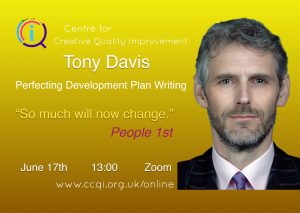Perfecting Development Plan Writing

In this Friday afternoon’s open session (17 June) we’ll be looking at perfecting development-plan writing. Delegates will also be given some simple tools to evaluate their own plan and judge whether or not it’s fit for purpose: www.ccqi.org.uk/qip.
Does that come across a little dry as an introduction? I hope not, as development planning is one of the most creative parts of any education-related day job. Trouble is, for many, it feels overly bureaucratic and is often fundamentally flawed by the process used to create it. See what you think…
Self assessment and development planning are separate processes and should be in separate documents. (I know, sounds a bit dictatorial, but bear with me.)
Too often, I hear managers telling staff that ‘The improvement plan is the most important part of self assessment!’ But as with any database, if you put rubbish in, you get rubbish out, and if you tie these independent processes together too closely, you risk producing a document fit for the tip, or at least a document that will fail in its improvement mission, blind people to the real way forward, and allow bureaucracy to invade your already overloaded day jobs.
So try this first test. Ready through your self-assessment report and see if there are any statements that say what you intend to ‘do’ next year. You often find these after less-than-good judgments. Sometimes, however, they’re written on ‘billboards’, with every Area for Improvement written as an action or aspiration.
The moment you allow yourself to write an ‘intention’ in the self-assessment part of the process is the moment you stop looking for the root-cause behind the symptom you’re wrestling with. As you can never resolve a symptom directly, this can be a huge issue, as it can cause staff to put a lot of energy into ‘stuff’ that doesn’t impact on the real root-cause issue. ‘Poor attendance’ and ‘poor behaviour’ are classic examples of this.
Another ‘corner’ you can find ‘action’ text in is after a judgement of ‘good’. Have a look for that wonderful word: ‘however’. Sadly, not many providers write the howevers, but you should have one after every judgement of ‘good’ – otherwise you won’t have a roadmap to outstanding. Writing the howevers is arguably the most technically challenging part of SAR writing. To see what I mean, try this quick thought experiment. Imagine an aspect of your provision that’s good, then say: ‘However…’ and see where your instincts take you.
If your instinct is to say ‘However, this is what I intend to do next’, then you’ve fallen into the trap of writing action text in your SAR. The ‘however’ should state your best hypothesis about what’s holding back that aspect of provision from being outstanding; the root-cause issue.
So the output of self assessment should be a list of root-cause issues (not symptoms). This then becomes the input for development planning. If you don’t get this right, then not only are you going to cost yourselves a great deal of time, but you’re also going to give this wonderful process, and quality improvement in general, a bad name.
But this is just the beginning. There are several other major issues that can flaw your development plan, and we’ll be getting under the skin of each of these on Friday.
Here are a few comments that might give a sense of the impact this session could have:
- ‘Plato’s cave’ Belfast Metropolitan College
- ‘Like arriving at the top of a mountain to finally get the most fantastic view – a clear view, no background noise.’ Hull College
- ‘I will introduce more time for professional discussion and focus the team’s efforts on root cause analysis.’ Buxton & Leek College
- ‘Allocating champions, rather than making someone ‘responsible’, has the power to change the game in terms of ownership and staff buy-in.’ College of West Anglia
- ‘Sharpening the saw!’ Kingston Maurward College
And one of my favourites:
- ‘The little boy has his finger in the hole but he needs to rebuild the dyke!’ York College
Do join us if you can, and do please tag any of your colleagues who might be interested, and/or share with your own networks if you’re able. As usual, booking details can be found here: www.ccqi.org.uk/qip.
Hope you can join us. Thanks for reading.
Best wishes
Tony
#FE #self-assessment #c4cqi #JoyFE #UKFEchat #TonyDavis




Comments
No comments yet